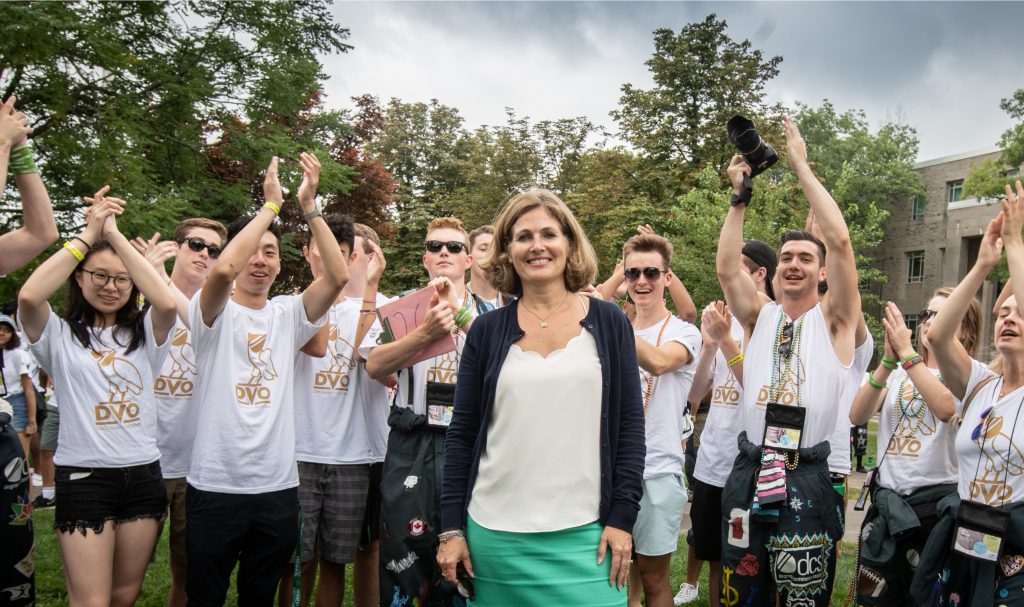Welcome to Sue McCracken’s family

Sue McCracken, associate dean of academics for the DeGroote School of Business, is determined to help students to feel a sense of belonging from Welcome Week, even before classes start. Photo by J.D. Howell
BY Sonia Verma
September 21, 2018
There are hundreds of books in Sue McCracken’s office, and nearly every one has the word “Accounting” emblazoned across it in big letters.
McCracken, a chartered professional accountant who teaches accounting and researches auditing practices, is also the director of the CPA/DeGroote Centre for the Promotion of Accounting Education and Research.
So when she says, “The longer you talk to me, the more you’ll realize one subject keeps coming up,” she probably means accounting, right?
Wrong.
“I’m always talking about relationships,” she says with an amused look. “I really, really like to understand people.”
McCracken’s research — while undoubtedly focused on accounting — explores the relationships and interactions between all the parties involved in audits, which are typically auditing partners, companies and shareholders.
“I’m not a traditional accounting researcher,” she admits. “It’s probably been a bit riskier approach to research, but if I’m going to be doing it, I want to be doing something I’m interested in and like.
“And I like to understand the dynamic between people.”
As associate dean of academics for the DeGroote School of Business, McCracken’s interest in relationships still drives her work, including her ambitious vision for the students, curriculum and some day, the building that houses the school of business.
Or, as she sees it, the DeGroote family.
“I want people to be proud that they’re part of DeGroote,” McCracken says. “That we’re all here for one another, and we support one another. It’s a feeling of belonging, that we’re all here to make everyone’s experience better.”
That experience begins now, at the start of the school year, “the time when people are most excited to become a part of something,” she says. And she is determined to make it start right.
That’s why the 900 students of this year’s first-year DeGroote cohort will gather for DeGroote in the Field, a full day of welcoming activities in the heart of campus on Saturday, Sept. 22, as part of the first-year Business Orientation class — Commerce 1DE0.
“We’ll have a tent, we’ll have activities, we’ll have lunch, we’ll have senior students talking about their experiences,” McCracken says of the event at Burke Science Building Field. “We’ll feel like a family.”
That sense of family and belonging is central to McCracken’s vision for DeGroote. She started her tenure as associate dean last year by instituting monthly coffee and cookie drop-ins with students in the school’s atrium. She organized similar sessions to allow first-year instructors and their students to get to know each other outside the classroom.
But a lot of first-years don’t really have a reason to wander through the DeGroote building, which is heavier on faculty and administrative offices than classrooms or student-focused spaces, she notes.
“Right now, for the first two years, our undergraduate students might never have a class in this building — we don’t have the classroom space,” she says of the building. “They’re spread out over the campus.”
She and others at the school of business are working on plans for an extension to the existing building, which she hopes will help bring the DeGroote family a bit closer.
“The students would all be in there right from the very beginning,” she says. “And they’d have a place to call home.”
While plans for the building are still in the preliminary stages, the proposed space would be student-focused, with few or no faculty offices. It would house study space, cutting-edge innovation space, collaboration rooms, practice presentation rooms, a cafe, an auditorium and an immense number of spots where students could hang out when they’re not in class.
Some of the students’ experiences as undergraduates will shape their personalities, careers and relationships for the rest of their lives, McCracken notes. “That time between classes is a vital part of their education.”
And that education is changing too, to reflect seismic changes in technology and how businesses and the professional world work.
“The world of work is nothing like it was even five years ago, and we need to prepare students for that,” McCracken says. “The key thing I want from our undergraduate program is that our students learn how to learn, because their jobs are going to be changing, and they have to know how to adapt.”
Another key part of the commerce program — “and this is a real strength at McMaster,” McCracken says — is that it will involve collaboration between students from business and all the other faculties.
“When you’re working, you don’t deal with people who are exactly like you,” McCracken points out. “Learning to communicate with people who have other areas of expertise is what sets you apart and lets you rise to the top. That’s what we want all our students at McMaster to have.”
For all they learn as part of the DeGroote family, McCracken wants to prepare her students to become part of something bigger after they walk out the door with their degrees.
“As a really great business school, of course we can deliver the content,” she says. “But what you do with what you learned, and how you apply it to impact the rest of the world, that’s what really counts.”


